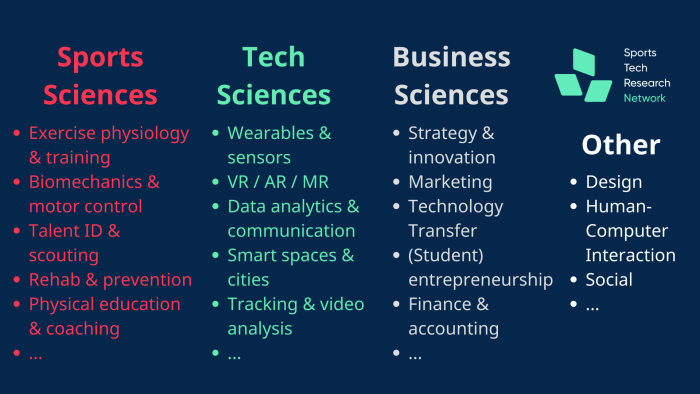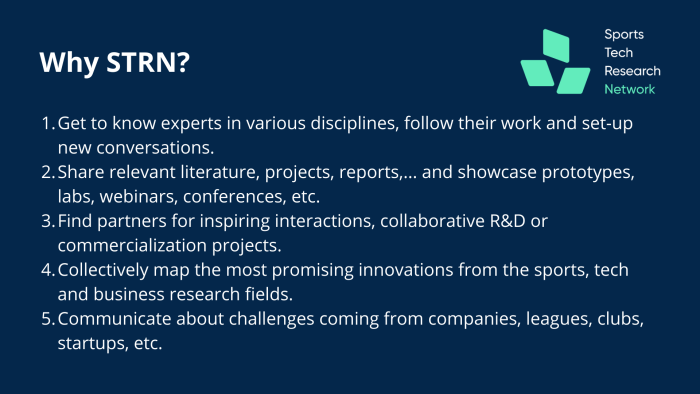The newly formed Sports Tech Research Network aims to build bridges between the best Sports, Tech, Business or other scientists and research-driven industry (and non-profit) experts with the objective to make this highly fragmented space more transparent and visible to both the academic as non-academic world. As such, we hope to bridge the gap between the academic, industry, and application sides of Sports Tech. With this, more valuable products and services may enter the marketplace.
We start with offering content here on the website and in a closed LinkedIn group and ask experts to provide us some feedback in order to define priorities with the network. As such:
As an academic, you can start presenting yourself and the capabilities of your group (expertise, papers, projects, etc.), connecting with experts you don't yet know, and set up new conversations and partnerships.
As a non-academic, the floor is open for research-related questions and challenges, suggestions concerning events, job and speaker opportunities, or collaborative R&D and Tech Transfer explorations.

Why are we doing this?
Sports Tech is booming and so is the innovation within it. Historically, the focus has been on materials, aerodynamics, and all kinds of physical product characteristics. Since the 1990s, Sports Engineering is a discipline in itself. But over the past decade, the role of sensor, computer and data technologies has drastically increased.
In the academic world, the importance of multi-disciplinary collaborations and societal & economic impact creation has gained more attention over the years. More and more researchers are involved in all kinds of projects in a high variety of faculties and departments, which makes it hard to allocate time wisely when it comes to university-industry interaction.
From the industry perspective, competition between Sports Tech companies is increasing and so is the importance of scientific validation and additional (technological and business model) innovation. Teams are also confronted with the fact that thousands of startups are offering them solutions of which they don't know whether or not they are actually working. The same applies to federations and leagues.
From a societal point of view, the need for digital (& other) solutions in the areas of (youth) sport, physical activity & health for the general population has never been so high.
As a consequence, it’s very hard to get a good view of the latest findings and innovations related to Sports Tech Research, even for experts within 1 or more of the above-mentioned domains. Anno 2020, there's still a large gap between experts from various academic fields when it comes to Sports Tech. The same can be said when looking at research in relation to industry and society.

Based on these needs, a new initiative called the Sports Tech Research Network (STRN) kicked off with a mission to connect the best Sports, Tech & Business scientists and the most advanced research-driven industry and public government representatives. It aims to facilitate breakthrough innovations relevant to sport on a global scale. In order to do so, STRN helps in 1) bringing together researchers from various sports scientific fields, technological disciplines, and business-related study domains, 2) increasing the visibility and relevance of their work, and 3) linking them with relevant research-driven industry and public government representatives. Thereby, STRN creates a one-stop-shop for everything that is related to Sports Tech Research'.

Behind the initiative is the Ghent University in Belgium and its sports innovation consortium Victoris, which experienced a clear gap in this ecosystem. The new network mainly aims to bring together those people and organizations which are open for collaborative research and development initiatives, spin-off creations, events or any other type of projects which facilitate qualitative R&D and go-to-market strategies when it comes to Sports Tech. STRN plans to create content that will increase the visibility of qualitative groups and institutes and their most promising projects, prototypes, conferences, etc. A mix of articles, interviews, and podcasts will be shared on the initiative’s website and LinkedIn group. In a later stage, both online and offline roundtable meetings, meetups, and other types of events will be organized on the basis of the needs of its members and partners.
Challenges & general approach
During the past couple of months, we tried to map (from a general point of view) the Sports Tech Research ecosystem. We noticed that the field is very fragmented and often barely visible. Nevertheless, there appears to be an increasing interest in the academic side of sports technology by companies, federations, and governments. This is probably because many available technologies in the sports sector have never been tested, and as a result, have never shown their added value, which could mislead many people and even cause harm in some cases.
On the other hand, it’s clear that there is already extensive know-how and technological innovation available worldwide in various complementary sectors and study domains. However, this know-how is often hidden under the radar, at a low Technology Readiness Level, or without the right people involved to actually create an impact.

In a sector that is becoming more and more competitive, we believe that the research community can and should play a larger role in the next decade in relation to companies, startups, and other parties in the sports world in order to develop and implement the most promising innovations. In addition, the rapid rise of technology within sports also forms the basis for many interesting topics of investigation, which (surprisingly enough) have never been conducted before. In the upcoming months, we’ll publish content on the various initiatives in Europe, North America, Asia, and other regions and how they relate to various focus areas such as wearables, performance tracking, esports, and other relevant domains.
The Sports Tech Research Overview
When looking at sports technology research, most of the work is coming from three different areas: Sports Sciences, Technical Sciences (relevant for sports), and Sports Business sciences. Each of these has particular disciplines in which researchers have already completed a multitude of R&D projects related to sports, such as the biomechanics and the exercise physiology fields. Both of these have a clear link with disciplines in the technical sciences field. A good example is the development of new biomechanical models and training methods in running, cycling, and swimming sports on the basis of new sensor technology in combination with machine learning techniques. In other disciplines, such as talent identification and scouting, rehab and prevention, and physical education and coaching, those links seem to be less established so far, in spite of the increasing attention for these links in the domain-specific literature.

Looking at it from the perspective of the technical sciences, we believe many technological innovations with a focus that is different from sports could also be relevant for various sports application domains. This is definitely true when these innovations are combined with sports scientific expertise. For example, video system technology such as markerless motion capturing developed for industry use cases might be highly relevant in gymnastics when combined with insights from biomechanics, injury prevention, or rehabilitation.
Similarly, smart gyms could benefit from insights in the physical education and coaching domain, such as how to motivate teenagers based on self-determination theory.
Furthermore, much expertise within the business and management fields related to sport is highly relevant, definitely when looking at topics as how academic know-how is being commercialized, how technologies in sport may or may not impact the relationships teams have with their athletes and fans, or how economic and societal impact of innovations may be evaluated.
Lastly, many other domains, not to be categorized within one of the three major domains, may be of interest. Design experts, communication specialists, and those studying human-computer interaction may have very important insights into how new technological innovations should function from a user perspective, which may drastically impact the way the final product is adopted during implementation.
Also, lots of research from other sectors may be applied to the sports sector in the upcoming years. Multidisciplinary collaborations may therefore be highly relevant, both in the academic world itself and probably even more in the intersection with companies, teams, federations, and other sports-related organizations.

Summarized, we're there to build more bridges when it comes to Sports Tech Research. We hope you enjoy the content on the site (we hope it's useful) and we look forward to hearing your feedback. Don't hesitate to join our LinkedIn group and/or Contact us for more detailed info.
We're also looking for people or initiatives who want to get involved and support us. We’re looking forward to hearing from you soon!





